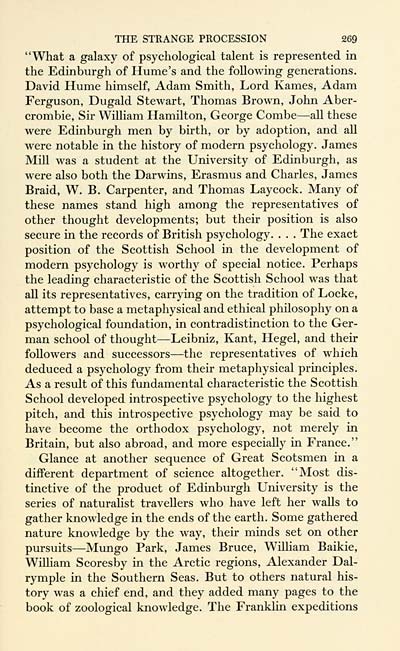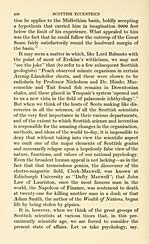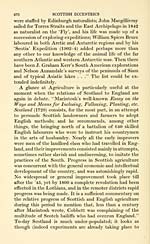Ossian Collection > Scottish eccentrics
(285)
Download files
Complete book:
Individual page:
Thumbnail gallery: Grid view | List view

THE STRANGE PROCESSION 269
"What a galaxy of psychological talent is represented in
the Edinburgh of Hume's and the following generations.
David Hume himself, Adam Smith, Lord Karnes, Adam
Ferguson, Dugald Stewart, Thomas Brown, John Aber-
crombie, Sir William Hamilton, George Combe — all these
were Edinburgh men by birth, or by adoption, and all
were notable in the history of modern psychology. James
Mill was a student at the University of Edinburgh, as
were also both the Darwins, Erasmus and Charles, James
Braid, W. B. Carpenter, and Thomas Laycock. Many of
these names stand high among the representatives of
other thought developments; but their position is also
secure in the records of British psychology. . . . The exact
position of the Scottish School in the development of
modern psychology is worthy of special notice. Perhaps
the leading characteristic of the Scottish School was that
all its representatives, carrying on the tradition of Locke,
attempt to base a metaphysical and ethical philosophy on a
psychological foundation, in contradistinction to the Ger-
man school of thought — Leibniz, Kant, Hegel, and their
followers and successors — the representatives of which
deduced a psychology from their metaphysical principles.
As a result of this fundamental characteristic the Scottish
School developed introspective psychology to the highest
pitch, and this introspective psychology may be said to
have become the orthodox psychology, not merely in
Britain, but also abroad, and more especially in France."
Glance at another sequence of Great Scotsmen in a
different department of science altogether. "Most dis-
tinctive of the product of Edinburgh University is the
series of naturalist travellers who have left her walls to
gather knowledge in the ends of the earth. Some gathered
nature knowledge by the way, their minds set on other
pursuits — Mungo Park, James Bruce, William Baikie,
William Scoresby in the Arctic regions, Alexander Dal-
rymple in the Southern Seas. But to others natural his-
tory was a chief end, and they added many pages to the
book of zoological knowledge. The Franklin expeditions
"What a galaxy of psychological talent is represented in
the Edinburgh of Hume's and the following generations.
David Hume himself, Adam Smith, Lord Karnes, Adam
Ferguson, Dugald Stewart, Thomas Brown, John Aber-
crombie, Sir William Hamilton, George Combe — all these
were Edinburgh men by birth, or by adoption, and all
were notable in the history of modern psychology. James
Mill was a student at the University of Edinburgh, as
were also both the Darwins, Erasmus and Charles, James
Braid, W. B. Carpenter, and Thomas Laycock. Many of
these names stand high among the representatives of
other thought developments; but their position is also
secure in the records of British psychology. . . . The exact
position of the Scottish School in the development of
modern psychology is worthy of special notice. Perhaps
the leading characteristic of the Scottish School was that
all its representatives, carrying on the tradition of Locke,
attempt to base a metaphysical and ethical philosophy on a
psychological foundation, in contradistinction to the Ger-
man school of thought — Leibniz, Kant, Hegel, and their
followers and successors — the representatives of which
deduced a psychology from their metaphysical principles.
As a result of this fundamental characteristic the Scottish
School developed introspective psychology to the highest
pitch, and this introspective psychology may be said to
have become the orthodox psychology, not merely in
Britain, but also abroad, and more especially in France."
Glance at another sequence of Great Scotsmen in a
different department of science altogether. "Most dis-
tinctive of the product of Edinburgh University is the
series of naturalist travellers who have left her walls to
gather knowledge in the ends of the earth. Some gathered
nature knowledge by the way, their minds set on other
pursuits — Mungo Park, James Bruce, William Baikie,
William Scoresby in the Arctic regions, Alexander Dal-
rymple in the Southern Seas. But to others natural his-
tory was a chief end, and they added many pages to the
book of zoological knowledge. The Franklin expeditions
Set display mode to: Large image | Transcription
Images and transcriptions on this page, including medium image downloads, may be used under the Creative Commons Attribution 4.0 International Licence unless otherwise stated. ![]()
| Early Gaelic Book Collections > Ossian Collection > Scottish eccentrics > (285) |
|---|
| Permanent URL | https://digital.nls.uk/81911764 |
|---|
| Description | Selected books from the Ossian Collection of 327 volumes, originally assembled by J. Norman Methven of Perth. Different editions and translations of James MacPherson's epic poem 'Ossian', some with a map of the 'Kingdom of Connor'. Also secondary material relating to Ossianic poetry and the Ossian controversy. |
|---|
| Description | Selected items from five 'Special and Named Printed Collections'. Includes books in Gaelic and other Celtic languages, works about the Gaels, their languages, literature, culture and history. |
|---|

